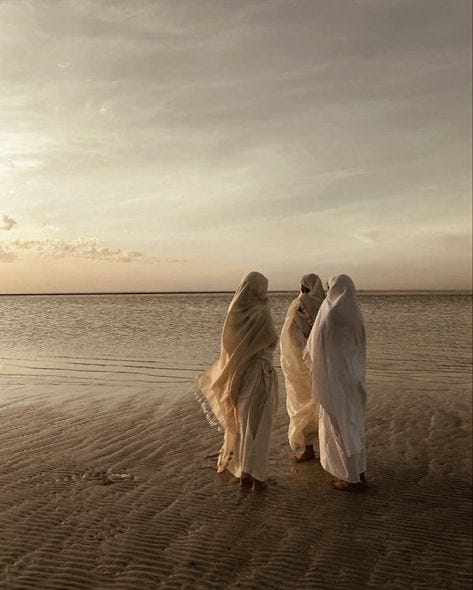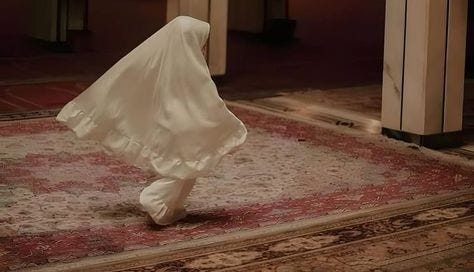It’s Not an Influencer or a Brand’s Job to Teach You How to Practice Your Religion
The Real Issue? You Don’t Have a Backbone.
This might send some hate my way, and I’m okay with that. But this has been sitting heavy on my heart for a while: It’s not an influencer’s or a brand’s job to teach you how to practice your religion.
Every week, it feels like the internet is outraged by another girl taking off her hijab. People say, 'It’s become a trend at this point,' and influencers and brands are blamed for not showcasing the 'proper' hijab.
But the real issue isn’t the influencers or the brands. It’s deeper than that. The core problem is the lack of backbone, self-control, and self-accountability within ourselves. And isn’t that what our religion is truly about?
When Allah made alcohol haram, influences were everywhere. You couldn’t escape it. But that was the whole point—self-control, fighting your nafs, and choosing faith over temptation. The test was never meant to be easy, and it certainly wasn’t meant to depend on who or what you follow online.
“Everyone is taking off their hijab.” Ummm... not really.
There are thousands of Muslim creators and influencers who wear their hijab with pride. There are hundreds of brands that showcase proper hijab styles. Not everyone is taking off their hijab—it only feels that way because negativity is amplified on social media. People love to attack the one girl who takes it off, while the majority of women who remain steadfast are overlooked.
And I truly hate to be the one to say it, but the gag is, every time I see someone attacking another woman for her hijab journey, I check their page only to find out they don’t wear their hijab properly either. How dare you?
As an influencer myself, my favorite comments and DMs are from girls who say they’re inspired to wear the hijab because of me. And that means the world to me because, before I even posted my first YouTube video, I set a genuine goal: “I want to inspire, reach great lengths, and do it all in the comfort of my hijab.” It wasn’t just about wearing it—it was about being strong in it.
But let me keep it real—I wasn’t always a hijabi online. When I first started posting on TikTok in 2021, I wasn’t wearing the hijab. I was rocking a different hairstyle every week. It was during Ramadan that year that I decided to try wearing it. Even then, I had my edges out. I loved curling those two front pieces of hair and letting them peek out of my hijab.
I still didn’t wear a hijab to the gym back then. I felt comfortable showing up in leggings and crop tops, sometimes pairing short sleeves with a hijab (I know, I cringe too). Eventually, I transitioned to a little scarf with my leggings and maybe a long-enough T-shirt to cover my glutes.
Then, I evolved to wearing long sleeves that covered me better, paired with that same little scarf. I ditched the leggings and started opting for sweatpants or wide-leg pants.
I know what it’s like to struggle—to fall short and to pick myself back up. And because of that, I will never judge another person. They might be somewhere on their own journey, taking it step by step. Allah is guiding them, just as He guided me.
Because even when I was walking into the gym in a crop top and leggings, I was moving towards becoming a hijabi. I was moving towards Allah and strengthening my faith, one imperfect step at a time.
Zoom out of your little social media bubble and take a look at the real world—where actual people are living their lives, not just posting them.
In real life, no one makes a big deal when someone struggles with their hijab. I know women who wear it every day except for their birthday, or when they go on vacation, or at weddings. I know women who don’t wear it to the masjid but put it on when they pray. I know women who don’t wear hijab at all and are still respected.
What is going on??
I get it—it’s easy to hide behind a screen, drop a harsh comment, and rack up a few likes that give you a quick ego boost. But honestly? That’s such loser behavior.
The truth is, in the real world, struggles with hijab aren’t as sensationalized as they are online. People have grace, empathy, and understanding. Meanwhile, the internet is out here blowing up over every small thing, amplifying negativity, and pretending it’s a moral crusade.
Not everything is as black and white as it seems online. Real life is nuanced. Real people are on their own journeys, and that deserves respect—even when it doesn’t fit your narrative.
"It’s an influencer’s JOB to influence—they are causing young girls to take off their hijab."
This is always the argument. And it’s so unfair.
Yes, an influencer’s job is to influence and inspire, but they do that in so many different ways—by sharing ideas, recipes, and personal journeys. It’s not their responsibility to be your personal “ideal Muslim.”
There are so many reasons to be inspired by someone.
It could be their work ethic, their healthy lifestyle, their vulnerability, or their ability to tell stories and connect with others. Inspiration comes in many forms, and it’s important to remember that just because someone falls short in one area doesn’t mean they can’t be strong in others.
Even when influencers fall short or struggle, their intention is rarely to corrupt or mislead people. That’s a heavy burden, and ultimately, only Allah knows what’s truly in their hearts.
We need to stop putting influencers and brands on a pedestal. It’s unfair. They are just as human and normal as the rest of us. They shouldn’t have to be perfect so that you don’t fall into sin.
A Reality Check: Personal Accountability
Whether or not you are influenced by someone is ultimately a decision you make.
But here’s the thing—many of those decisions are made subconsciously. If you’re not aware of your own thought patterns and inner world, you might find yourself influenced without even realizing it.
This is why self-awareness is so powerful. When you understand yourself, you can consciously choose what influences you and what doesn’t. You become the driver of your own life, not just a passenger swayed by every new trend or opinion.
On the Day of Judgment, you will be standing there alone. No influencer, no brand—just you and your deeds.
And honestly, how lame is it to let someone else control your life and your akhirah? How frightening is it to think that someone you don’t know could shape your decisions, your life, and ultimately, your mind?
This is why self-awareness is critical.
The Power of Self-Awareness
You need to understand yourself.
Question why you do the things you do. Establish a set of values and morals that guide you through life.
No matter how many people around me take off their hijab, I can look inward and remind myself of my own values and beliefs. I can stay steadfast because I’ve built that self-confidence and discipline.
I’ve exercised that muscle enough. My vision of who I want to be is clear.
When you see a video of someone deciding to take off their hijab and you decide that’s your cue to take yours off too—that’s not about that girl. That’s about you.
It’s about your paradigm. Maybe you have negative beliefs about the hijab. Maybe it was forced on you as a child, and now it’s become something you resent. Maybe you’ve never truly understood why we wear it, and that’s why you chose to take it off.
On the flip side, if you see that same video and say, “Omg, that could never be me,” and feel the need to leave a hate comment—that’s also an inner problem. That’s your ego and insecurities talking.
Maybe you hate yourself so much that seeing someone else struggle or fall gives you a perfect opportunity to feel good about yourself. And maybe that’s the only time you feel good about yourself.
Yes, It Is That Deep
“Bahja, it’s not that deep.”
But yes, it is that deep.
You don’t take action on anything unless it aligns with your belief system. And that’s what you’ll be judged on in the Day of Judgment—the actions you took because of what was truly in your heart and mind.
Not only that, but your life will become a series of things you hate. You won’t feel fulfilled because you’re not living in alignment with who you are and what you believe.
When you let your subconscious beliefs dictate your actions without checking them, you end up living a life that doesn’t even feel like your own. And that’s the real tragedy.
"Until you make the unconscious conscious, it will direct your life and you will call it fate."
- Carl Jung
Nobody Is Perfect—And That’s Okay
I’m not perfect. I know, just like anyone else, I can fall into sin.
That’s why it’s so important not to judge another person. They are no less than you. You are no better than them.
Now, I’m not saying an influencer can’t inspire people to become better Muslims. There is pressure when you have a platform to set a good example for those who look up to you.
But perfection? It’s not possible. We can strive to be good, but expecting perfection from anyone—especially influencers—is not fair to them or to yourself.
The goal is to build enough strength and discipline within yourself that your decisions come from a place of clarity, not mimicry.
How to Build a Backbone in a World Full of Noise
The answer is simple but powerful: tap into yourself.
Check in on your paradigm. What do you believe? When you encounter not just someone taking their hijab off but anything that triggers you—how does it make you feel? What thoughts come up?
Why do you do what you do?
These are important questions to ask because only when you become aware of the subconscious parts of yourself can you start making real changes in your life.
The Work: Changing Your Beliefs
Changing your beliefs about anything takes time, effort, and patience. You have to create enough evidence for yourself to make a belief stick.
This happens through education, action, and repetition.
For example, if you see a video of a girl taking her hijab off and think, “Ugh, I want to take mine off too,” pause. Ask yourself why you feel that way. What beliefs do you hold about the hijab?
Write this out in a journal.
Here’s What That Can Look Like:
Current Beliefs:
"I hate my hijab because I just feel ugly in it."
"I love wearing cute outfits, and sometimes the hijab doesn’t always fit the vibe."
"I feel embarrassed because all my friends don’t wear it, and it makes me feel less appealing."
"Wearing a hijab makes me stand out, and I don’t like the attention."
"I feel like I’m not as fashionable or 'cool' as girls who don’t wear it."
Now, What Would You Like to Believe About Hijab?
Desired Beliefs:
"My hijab is a crown of strength and dignity."
"I can express my style beautifully while honoring my faith."
"I feel safe, protected, and proud when I wear my hijab."
"My hijab is a reminder of my commitment to Allah, and that’s more important than fitting in."
"I attract the right kind of attention—respect and admiration—for being true to myself.
The Practice: Building These Beliefs
It doesn’t matter if you’ve decided to take your hijab off, if you wear it one day and not the next—what matters is building these beliefs through practice and repetition.
Every day, remind yourself of these new beliefs. Repeat them. Say them out loud.
Practice wearing your hijab daily, even if it’s just around the house.
Curate your social media feed with hijabis and modest fashion inspiration.
Experiment with modest styles that make you feel confident.
Make duaa (prayer) and ask Allah to make it easier for you.
It’s okay to unfollow non-hijabis for a while until your beliefs are strong enough not to be triggered.
Like I shared before, every day that I walked into the gym in a crop top and leggings, I was practicing a new way of thinking and feeling.
Those small steps eventually led me to show up in a T-shirt that covered my glutes. The more you practice, the stronger these neuropathways become in your brain.
It gets easier over time because it becomes a natural part of who you are.
And this doesn’t just apply to your hijab journey—it applies to everything in your life. Whether it’s your finances, your health, or your relationships, you are only as limitless as your beliefs allow you to be.
That’s why you need to check in with yourself constantly. Challenge your thoughts, question your habits, and make sure the story you’re telling yourself aligns with the life you want to live.
A Letter to My Girls


To my girls who are struggling—I pray that Allah makes it easy for you.
To the brands working to make modest fashion more accessible—thank you for what you do.
To the girls who share their journey and struggles—thank you for your vulnerability. It truly is inspiring.
Don’t let the hatred, disrespect, and chaos of social media make you forget the beautiful peacefulness, kindness, and gentleness of Islam.
What a blessing it is to know that no matter how many times you fall, Allah still loves you.
His mercy is endless, and His door is always open. So, hold onto that. Seek His guidance. Allow yourself to grow, stumble, and get back up—because, at the end of the day, the journey is between you and Him.
My corner of the internet will always be a safe space for us to navigate this world together, with love, honesty, and a little bit of tough truth.
I love you all so much,
Bahja
p.s. Jummah Mubarak 🤍✨






This is such a great reflection, we really do have to recognize that no one is perfect and should only look towards Prophets for influence. Surah Baqarah also condemns blind belief from the people of the book who blinded followed their leaders when Islam was introduced instead of learning about Islam and making their own judgments about what religion to follow. And like you said, at the end of the day, we will be standing alone and held accountable for our own actions and no one to blame.
Btw I love your yt videos and I’m so happy to discover you’re also on Substack!
Yes! “His mercy is endless, and His door is always open. So, hold onto that. Seek His guidance. Allow yourself to grow, stumble, and get back up.”